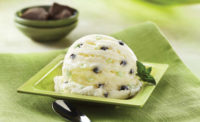

But at North Aurora, Ill.-based Oberweis Dairy, home delivery is playing a crucial role in the company’s expansion and, according to its leaders, may just be the greenest thing in town.
With a single plant and $67 million in sales, Oberweis is a small company by most standards (it ranks 99th on our latest Dairy 100 ranking). But like the great civic visionary Daniel Burnham, it makes no small plans. Over the past decade, Oberweis has expanded its home delivery service from the Chicago metropolitan area to Milwaukee, Indianapolis and St. Louis, and has gradually grown its chain of ice cream and dairy stores (currently numbering nearly 50), all supplied from its plant about 40 miles west of downtown Chicago.
Then earlier this year, the company made a great leap eastward, taking over the home delivery routes of the shuttered Yoder Dairy in and around Hampton Roads, Va. The move could add as many as 3,000 new home delivery customers to the 30,000 in its Midwestern market.
“We had been looking to expand to the East Coast for a few years,” says Joe Oberweis, company president and fourth generation family management (his great-grandfather founded the company). “The closing of Yoder Dairy in Virginia gave us an opportunity to have an immediate presence on the East Coast. We plan to continue to expand our home delivery on the East Coast and we will eventually open our own stores in the areas that receive home delivery.”
Jim Oberweis, company chairman and Joe’s father, says they considered acquiring Yoder’s bottling plant as well, but financial obstacles stood in the way. “We ended up buying their customer list, trucks, bottle washer and hiring their employees,” he says, noting that for the foreseeable future, Oberweis Dairy will haul milk from Illinois to service its Virginia customers. But continued growth will likely require a second plant in the east.
“We think this is a good time to expand. Values in the real estate market are better than one or two years ago [for new store locations],” Oberweis says. “We plan to grow, organically and through acquisitions if we find someone who’d like to join our team, particularly on the East Coast. We’re looking for average or above-average income neighborhoods where population is plentiful.”

Jim Oberweis adds: “Customers also seem to have an appreciation for a higher-grade product. … In some markets, it’s an educational process from ground zero. This market is educated on the advantages we can provide.”
What are those advantages? “The main selling points of our products are quality and taste,” Joe Oberweis says. “We feel that our product speaks for itself and that is why our customers return to Oberweis time and time again.”
Another advantage lies in a current trend. “Being in the business of returnable glass bottles, we’re looking for ways to help our environment. Returnable glass bottles are one step in that direction,” Jim Oberweis says. “We think home delivery itself may be a great solution. If one truck serves 150 homes, it may save 150 customers from making trips to the store.”
It’s not just milk that’s delivered. Oberweis offers a full range of dairy and other food products, including butter and cultured products (co-packed for the Oberweis brand) as well as baked goods, including a new cinnamon-pecan coffee cake that Jim Oberweis says is “to die for.”
And the company recently came up with a way to add its superpremium ice cream – in cups, quarts and single-serve tubes – to home delivery orders, with a new patent-pending dry ice container that allows frozen dairy products to stay frozen solid for up to eight hours while keeping customers from coming into contact with the potentially harmful dry ice.
Meanwhile, in St. Louis and some areas around Chicago, Oberweis has started a treat delivery program to provide cones, shakes and its new popular waffle bowl sundaes from its dairy stores via online ordering. “Order whatever you want and we deliver it in 45 minutes,” Joe Oberweis says.
“Our primary focus is building the service into something the consumer really wants,” he says of the overall home delivery push. “I don’t know if we’ve done that yet. So we’re looking at adding other products.”
The key, he says, is making the service “something they want to keep for the long haul, for its non-food benefits.” While telemarketing campaigns have worked in the past to generate new business, the company is taking things to a more personal level.
“We’re building a sales force that will go door to door to talk to consumers about our service,” Oberweis says.

For the people
Joe Oberweis has become the public face of the company, appearing in several quirky television commercials that, in one, put him in a white milkman’s uniform while extolling the virtues of home delivery to folks in a typical residential neighborhood. Another spot, for Oberweis’ ice cream, touts the treats as perfect for any occasion, with Joe sporting costumes to represent each, including the Fourth of July and Mother’s Day.“Our No. 1 concern is producing the best products and delivering them with a high level of service,” Jim Oberweis says. “While this economy has put some pressure on high-end products, our high-end ice cream is doing extremely well. I think people are holding on to their affordable luxuries.”
A discussion with the Oberweises about the economy and its impact on dairy consumers leads directly to one of the major thorns in their side: the government, or more specifically, the federal order system. “It promotes inefficient production and it hurts consumers across the country,” Jim Oberweis says, explaining that a system designed to promote milk consumption has actually had the opposite effect by driving up costs.
In exposing the flaws in federal orders, Joe Oberweis has penned a clever parody, applying the tenets of federal milk pricing to the orange juice industry, in which an “orderly market” is created by subsidizing orange production in Minnesota to match the output of Florida, with a pricing formula that favors juice oranges over fruit used for other products.
“A huge gain for the dairy industry would come as a result of ending federal orders. This would allow for more efficient production,” he says. “We have testified at USDA hearings against government involvement. We are considering forming a coalition to end the federal milk marketing order program.”
Of course, processors have learned not to hold their breath where federal order reform is concerned, so Oberweis Dairy has had to adapt to the ebbs and flows of the economy like everyone else. To combat volatile energy costs, especially now with a long-haul market to serve, the company has re-evaluated its route structure and invested in more fuel-efficient vehicles. Hybrids don’t appear to be the answer, at least not yet. “They’re not quite commercially viable but not far away,” Joe Oberweis says.
Something else growing in commercial viability of late is “rBST-free” milk, something Oberweis Dairy is quick to note it has always offered, and sees the current industry trend away from synthetic hormone use as vindication.
“I think it reached critical mass,” Jim Oberweis says of the mad dash away from rBST more than a decade after its introduction. “Big retailers finally didn’t want to deal with it.”
Minus this point of differentiation as competitors jump on the bandwagon, Oberweis Dairy would seem to have lost this edge. But Jim Oberweis says his company places its raw milk standards higher than most dairies, something that pays off with better taste that’s arguably worthy of the higher prices his products command at retail.
“We pay our farmers significant premiums for low bacteria count,” he says. “We think there’s a big flavor difference. ... Our product isn’t organic, but the farmers treat their animals humanely. We have 28 of the best family farms, and we pay them well to make sure they treat their animals well.”

History
In 1915, dairyman Peter J. Oberweis found that he had too much milk so he began selling it to neighbors around his Illinois farm, thus beginning a family dairy business that now spans almost 100 years.The Oberweis family has been delivering milk to homes since 1927, when Peter bought a half partnership in the Big Woods Dairy. A few years later he bought the entire enterprise, renamed it Oberweis Dairy and his teenage son Joe left school to help out.
In 1951, Joe Oberweis opened a new dairy on North Lake Street in Aurora, Ill., allowing Joe to perfect a formula, using the cream from his premium milk, to produce the best ice cream available – the formula still used by the company today.
This facility also permitted another Oberweis Dairy first: a retail store selling Oberweis products and an ice cream fountain serving up numerous frozen creations. There are now 48 Oberweis Ice Cream and Dairy stores throughout the Chicago area as well as St. Louis, Indiana and Michigan. The company’s current plant was built in 1996 in North Aurora, on the appropriately named Ice Cream Drive. It’s served by a fleet of modern home delivery trucks that bring fresh milk and dairy products daily to thousands of customers.
Today, the third and fourth generations of the Oberweis family operate the dairy that makes superpremium ice cream, milk and other products. Peter’s grandson, Jim, is the current chairman (he’s also known in Illinois for his campaigns for Congress and governor); and Jim’s son, Joe, is president. Joe’s niece has started working in the headquarters retail store, marking the fifth generation’s entry into the business.
The Oberweis Family of Products
The Oberweis brand can be found on a full range of dairy food products, from fluid to frozen to cultured. It bottles its own milk and manufactures ice cream and other frozen treats, while other products are made through contract packaging arrangements.Oberweis Dairy trumpets the fact its milk comes from cows not treated with synthetic bovine growth hormones. Its signature is its half-gallon glass bottles, sold at its own stores as well as select grocery retailers. Glass bottles carry whole, 2% and skim milk, along with chocolate milk, lemonade and iced tea. Some varieties also are offered in single-serve plastic bottles. Whipping cream and half & half are available, too.
Oberweis ice cream contains 18% butterfat and is available in about 40 rotating flavors – including Apple Strudel, Dulce de Leche and Udderly Truffles – at retail outlets as well as the company’s dairy stores for dipping into cones or other frozen creations. Also offered are ice cream pies and cakes.

